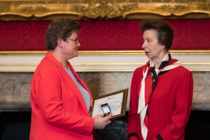DOT COOMBER (Campsfield House IRC)

DOT COOMBER (Campsfield House IRC)
AWARD WINNER 2017-18: Dorothy is the Learning, Skills & Regimes Manager at Campsfield House Immigration Removal Centre. She is granted an Award for transforming the educational opportunities offered to detainees in an especially challenging environment, across multiple languages, cultures, and nationalities. [Dorothy also receives the Keith Bromley Award for Education & Skills Training, supported by The Bromley Trust.]
Dot Coomber is the Learning Skills & Regimes Manager at Campsfield House Immigration Removal Centre (IRC) in Oxfordshire. She took on a knotty, largely overlooked problem – how to provide useful and accredited education over very short periods for a wide range of languages, cultures, and nationalities – and utterly transformed what can be achieved.
Dot quickly recognised that, with the average stay at Campsfield rarely exceeding 40 days, finding accredited education options – especially for such a diverse community, many of whom do not have English language skills – would be difficult. Undeterred, she identified and worked closely with a suitable provider, OCN Credit4Learning, a charity established in the 1980s, to develop a solution. The results are little short of inspiring, with around 500 certificates since awarded.
The Independent Monitoring Board annual report for 2016 was impressed, too, and noted that certified short courses are now offered in English, barbering, cleaning, food hygiene, IT and photography, with additional courses in the pipeline.
As Campsfield’s Head of Contract Management, Julian Jones, notes, Dot’s complete re-evaluation of the educational provision for detainees at Campsfield House had a significant impact, adding, “I feel that she took the very basic requirements of our contract and completely turned the overall provision of education on its head.” He goes on, “Dot has a very positive and ‘can do’ attitude. Her approach is always to find a way to do something or try something new.” Dot gets “involved in things she believes passionately about, and her work with OCN Credit4learning has resulted in her being invited onto the board. Despite the additional workload this is a task she approached with her usual gusto.” Campsfield’s art teacher, Sally Ashton-Bridges, adds a note on Dot’s personal supportiveness, saying, “staff feel able to voice any concern – we are lucky to have her”.
The testimonial of one detainee speaks for many:
“She is tremendously patient and always goes above and beyond to meet the needs of every person in Campsfield…we all recognise all that Dorothy does.”
Line manager Andy Carmichael says, “Dot is passionate” and “committed to improving the mental and emotional wellbeing of trainees” by providing them with enjoyable and meaningful activities. To this end, she redeveloped the old library into an IT suite with over thirty new computers. Online learning, one-to-one sessions, and multilingual orderlies helping English courses have all made a vital difference. Meanwhile she removed English books of limited interest and replaced them with over 30 e-readers. Over 800 books in different languages have since been downloaded. Dot has also been active in encouraging a flow of visits, including by Oxford Museums outreach and Oxford Concert Party Waving Hello, a project ‘challenging preconceived notions about refugees’.
Centre Manager John McClure explains how “Dot consults with detainees on what would assist when they return to their country of origin and develops a solution based around need.” He adds, “as far as I am aware Campsfield House is the only IRC in the UK providing this level of accredited qualifications to detainees and it is a model that should be adopted across the estate to assist in the goal of IRCs – successful removal and repatriation.”
Another benefit for the detainees “is that they are able to positively channel some of their psychological distress and issues relating to their detention through these creative mediums, thus the courses have an additional benefit to health and wellbeing.” Dot sees detainees’ biggest problems as “loss of dignity, hopelessness, boredom, and anxiety about their future.”
There are other advantages to her approach, too, including higher levels of satisfaction and pride among education staff as they watch detainees’ achievements. One striking impact of Dot’s pioneering approach is that:
“Detainees being deported feel that they do not have to be ashamed at going back to their families as they have gained qualifications and skills while being away.”
She cites two encouraging examples. One detainee wanted to return to India and enroll on a drama course – his goal was to become a Bollywood star. With help, he applied to attend an Indian University and was accepted. “He contacted me a few months after returning to let me know that he was happy and enjoying the course.”
Another deportee to India “wanted to open a mobile phone shop. He studied all the ICT courses and I put him on an on-line course for repairing mobile phones. He contacted me to let me know that he had successfully opened his shop.”
Dot’s ambition, understandably, is to develop and share this best practice with other Immigration Removal Centres, and we wish her every success.
